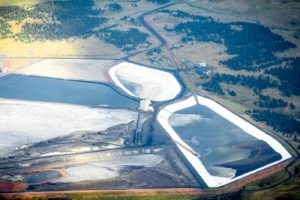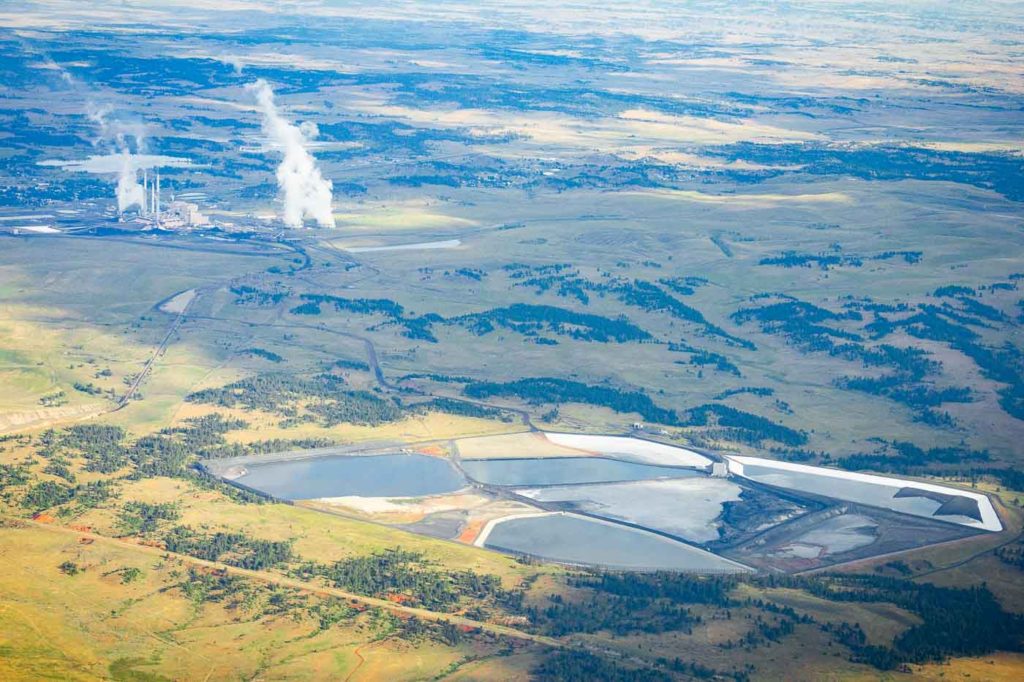As Colstrip Power Plant plans to shut down units 1 and 2, coal ash pond cleanup can keep plant workers on the job.
Northern Plains Resource Council and International Brotherhood of Electrical Workers (IBEW) Local 1638, which represents maintenance and operation workers at the Colstrip Power Plant, released a study finding significant jobs potential in thorough remediation of Colstrip’s leaking coal ash ponds.

The study, entitled “Doing It Right: Colstrip’s Bright Future with Cleanup”, looks at how other plants across the nation have closed their ash ponds and dealt with groundwater pollution. Case studies show that thorough cleanup is a major job creator, in some places employing from 50% – 90% of the plant’s operational workforce. In addition to creating more jobs, sites that removed their coal ash through excavation (instead of leaving it in place) also saw significant reduction in groundwater contamination.
“We all have a vested interest in ensuring the coal ash ponds for Units 1 and 2 are closed in the best way possible. Good clean-up has many benefits like stabilized home values, increased local tax revenue, and future employment opportunities for Colstrip’s workforce. It’s also imperative that we fix the groundwater pollution so that ranchers have usable water for their operations,” says Northern Plains Resource Council board chair Becky Mitchell.
The study’s findings are significant for Colstrip, where the impending retirement of power plant units 1 & 2 leave the community in need of additional employment opportunities. Coal ash pond leaks have also resulted in elevated levels of heavy metals and other pollutants in surrounding groundwater.
“We all have a vested interest in ensuring the coal ash ponds for Units 1 and 2 are closed in the best way possible. Good clean-up has many benefits like stabilized home values, increased local tax revenue, and future employment opportunities for Colstrip’s workforce.”
“IBEW 1638 sees an opportunity to keep skilled workers that are already in our community employed doing reclamation instead of being laid off and forced to leave the area for jobs,” says Ted Stimac, registrar for the IBEW Local 1638, explaining his union’s reason for partnering with Northern Plains on the study.
“These clean-up jobs need to happen, and they need to employ the local workforce,” adds Stimac. “It doesn’t benefit our community for an outside contractor to come in with an out-of-state workforce, doing jobs historically performed by resident workers of Local 1638.”
“IBEW 1638 sees an opportunity to keep skilled workers that are already in our community employed doing reclamation instead of being laid off and forced to leave the area for jobs.”
The Montana Department of Environmental Quality is currently reviewing the plant owners’ proposal to close the ash ponds and fix the groundwater leakage, and will be approving a cleanup plan within a year. According to Talen Energy’s well-monitoring reports, the impacted groundwater has levels of boron 37 times over the state’s water quality standard in places. The ash ponds currently leak approximately 200,000,000 gallons per year.
To date, Talen Energy has proposed covering the ponds with the coal ash left inside, also known as “cap-in-place.” Historically, this minimal “cap-in-place” methodology has resulted in fewer jobs and increased long-term pollution when compared to removing the contaminants through excavation.
Becky Mitchell adds, “Cleanup is required by law and we just want to make sure that it’s done right. Northern Plains was not involved in the shutdown of Units 1 & 2, but we are involved with the long term planning for the community’s safety and economic health. Good cleanup that hires the local workforce is an important component of what we hope is Colstrip’s bright and resilient future.”
Read more coal stories here.

